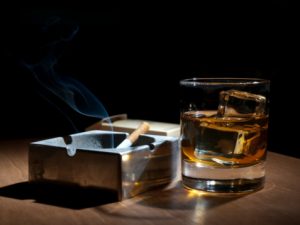 Numerous studies have shown a link between smoking and alcohol consumption, and new research has come to light that further explains the association. Previously, it was discovered that 85 percent of drinkers were also nicotine-dependent. The latest findings, which come from the University of Missouri School of Medicine, reveal that the association comes from the effects of smoking that cancel out the sleep-inducing effects of alcohol.
Numerous studies have shown a link between smoking and alcohol consumption, and new research has come to light that further explains the association. Previously, it was discovered that 85 percent of drinkers were also nicotine-dependent. The latest findings, which come from the University of Missouri School of Medicine, reveal that the association comes from the effects of smoking that cancel out the sleep-inducing effects of alcohol.
Lead author of the study Dr. Mahesh Thakkar, said, “We know that many people who drink alcohol also use nicotine, but we don’t know why exactly that is. We have found that nicotine weakens the sleep-inducing effects of alcohol by stimulating a response in an area of the brain known as the basal forebrain. By identifying the reactions that take place when people smoke and drink, we may be able to use this knowledge to help curb alcohol and nicotine addiction.”
Advertisement
Dr. Thakkar has been studying the sleep-inducing effects of alcohol and nicotine for over five years. His previous studies found that nicotine and alcohol increase the pleasure effects by activating the reward center in the brain, which leads to more alcohol consumption. For the latest findings rats were strapped with sleep-recording electrodes and given alcohol and nicotine. Their findings unveiled that nicotine counters alcohols sleep-inducing effects.
Dr. Thakkar added, “One of the adverse effects of drinking alcohol is sleepiness. However, when used in conjunction with alcohol, nicotine acts as a stimulant to ward off sleep. If an individual smokes, then he or she is much more likely to consume more alcohol, and vice-versa. They feed off one another.”
Smoking has been found to be a factor for alcoholism and the World Health Organization estimates seven million deaths a year are linked to alcohol and nicotine use. The findings can help improve health for smokers and drinkers as well as those with mental disorders, such as schizophrenia, which is closely linked to smoking.
